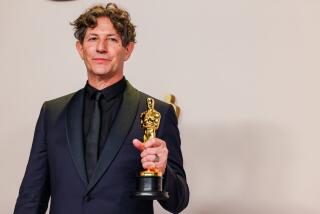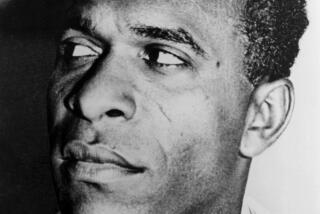Deep in thought over ‘Hannah Arendt’
How does one make a movie about thought?
That was the dilemma noted German director Margarethe von Trotta faced when she began work on her latest film, “Hannah Arendt,” which opened June 7.
The biopic reunites Von Trotta with actress Barbara Sukowa, who starred in five of the director’s previous films, including two biographies on strong, fearless women: 1986’s “Rosa Luxemburg,” which focused on the early 20th century political activist who was executed in Berlin in 1919, and 2009’s “Vision,” which depicted the life of the 12th century Benedictine nun Hildegard of Bingen.
REVIEW: More movie reviews from the Times
Arendt was a controversial German Jewish philosopher, political theorist and university lecturer who left her country when Adolf Hitler came to power and eventually settled in New York with her husband, German poet Heinrich Blucher.
She’s best known for a series of controversial articles for the New Yorker about the 1961 trial in Israel of Adolf Eichmann, the chief of the Jewish Office of the Gestapo who implemented the “Final Solution” — the total extermination of Jews.
Arendt was condemned by Israel and countless Jews in the United States and lost many of her own friends because of the articles, in which she coined the phrase “banality of evil” to describe Eichmann and other war criminals — maintaining that even the most ordinary people could commit the most vile crimes because they believed, like Eichmann, that they were just doing their job.
To add further fuel to the controversial fire, Arendt criticized Israeli’s handling of the trial, which led to Eichmann’s conviction and execution in 1962, and had harsh words for European Jewish leaders during the Holocaust. Her 1963 book “Eichmann in Jerusalem: A Report on the Banality of Evil” wasn’t published in Israel until the last decade.
PHOTOS: Hollywood backlot moments
The most chilling aspect of “Hannah Arendt” is the actual television footage of Eichmann on trial.
“I wanted absolutely to have this footage because if we would have used an actor, people would only see the brilliance of the actor, not the mediocrity [of the man],” Von Trotta explained. “I want the people who look at him to come up with the same sort of [opinion] that Hannah Arendt did.”
Early on, Von Trotta and her writing partner, Pam Katz, toyed with a traditional cradle-to-grave approach to depicting Arendt’s life, hitting points such as her love affair with her professor, noted philosopher Martin Heidegger, who later became a Nazi supporter, her marriage and life in New York, the Eichmann firestorm and her death at age 69 in 1975.
“We quickly realized it would be very poor in what you could tell,” the filmmaker said recently by phone from New York. “We couldn’t go into the profoundness of her thinking. So we decided to concentrate on the four years when she goes to Jerusalem and observed Eichmann, came up with the new theory of Nazi criminals and how that was accepted and not accepted.”
But the film isn’t just a heady philosophical exercise. Von Trotta also explores Arendt’s larger-than-life personality and her coterie of friends, including “The Group” novelist Mary McCarthy (played by Janet McTeer).
“When you read the correspondence between the two of them, you see they are gossiping a lot,” Von Trotta said. “I found that interesting to see these both really intelligent women speaking about husbands and men.”
Von Trotta addresses in flashbacks the philosopher’s complicated relationship with Heidegger, whom Arendt remained close to even after his involvement with the Nazis.
Von Trotta said Sukowa was the only actress she knew who could capture Arendt’s intellect and humanity.
“We really love to learn and explore things,” Sukowa said of her working relationship with Von Trotta.
Still, Sukowa said, playing “an intellectual giant was kind of scary. I am not a studied philosopher, so it was difficult for me to get into this. I had read Plato and Kant, but I had forgotten it. So I hired a young professor from Columbia University and I just started reading like crazy. “
More to Read
Only good movies
Get the Indie Focus newsletter, Mark Olsen's weekly guide to the world of cinema.
You may occasionally receive promotional content from the Los Angeles Times.







